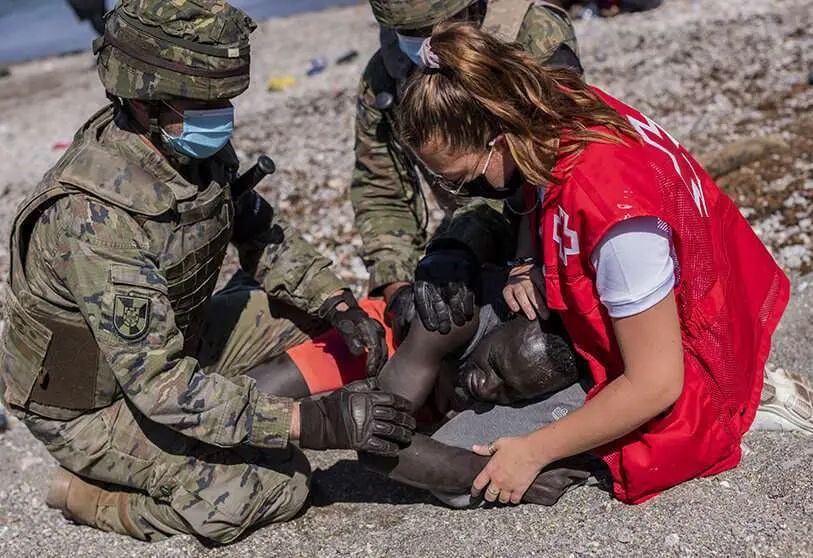From Madrid to the sky and from Ceuta to the Moon: the human side of the story

We were shocked as a society, for better or worse, depending on which side of society you are on, by the human embrace given by the young woman from Móstoles, Luna, to the young man "with no known identity yet", as some journalists say; although by the colour of his skin we all assume that he is from the reviled, marginalised and very often plundered black Africa.
Perhaps this anonymity, undesirable in many other cases, turns out to be the symbol of human nakedness of any rancid toxicity from which emanates hatred and antipathy, the vital sustenance of some who, out of respect for Luna, I will not mention. It is the symbol of the hundreds of thousands of anonymous people with their unique and unrepeatable stories who, amidst the hustle and bustle of the Mediterranean and the routes of death, have met their final fate in silence, without pain or glory. It is also the anonymity of millions of African peoples who suffer day by day the misfortune of having been born in a continent that is rich but plundered by the national and international masters and owners of its resources and wealth. It is the symbol of the most absolute misery metamorphosed into a man, dusty, naked, barefoot, exhausted, in short, what Africa is, who in a gleam of hope threw himself into the sea to look for what he imagined and which in the end could not be.
The Lunatic Embrace is a sincere show of the most human side of the history of the Mediterranean and of ours as a country, very different from those of Europe, mestizo, multicultural and extremely sensitive to the suffering of others. It is there, from serenity and lucidity, where I want to shed a little light, sow a little awareness in this subversive world, far from the diplomatic conflict, political debate and often the post-electoral residual anger of certain sectors of the class who say they represent our ideals! Didn't our grandparents have to emigrate to Africa, which opened its arms to them, just as Luna did, and integrated them into their societies, many of which were still colonised, to save their skins from an atrocious dictatorship that was ravaging a historically and socially distressed Spain? In case anyone is still confused, I invite you to look up, among other stories, the last voyage of the Stanbrook ship that sailed from Alicante to Oran-Algeria. Besides, nowadays, haven't our young people had to leave for Germany, Holland, the United Kingdom in search of a better life? Don't worry, we look to the north as much as they look to us from the south. It is a fact of life.
What Luna reminded us of is that side of the beautiful, real and human story that characterises the vast majority of our Mediterranean peoples, the melting pot of cultures, the meeting point and the starting point.
That black man in a swimming costume from the African Sahara did not know that when he arrived in Ceuta he would end up stepping on the Moon, he touched the land of Ceuta, but there Luna awaited him with open arms. It is not a call to illegal immigration "a term I seriously dispute", but a call to humanity to solidarity, that solidarity to which we lend a hand to our fellow man, from Carabanchel in Madrid, to the Rambla in Barcelona, passing through the neighbourhood of the three thousand dwellings in Seville.
Some win heaven after a long life of arduous works of kindness, but Luna won what she finds on earth, heaven and the moon together with a human embrace. That same embrace that, after a year of pandemic we miss so much. Luna's generosity should be framed in a picturesque painting in the most precious museum in the world, yes the museum of our hearts and our memory.
Thank you Luna for teaching us that, from the heights of benevolence, we can humbly embrace those who need us. We need more people like you. An African proverb says: "Each person has and represents a piece of his or her own name". So thank you, chokran, thank you and Asante Sana (in Swahili).
